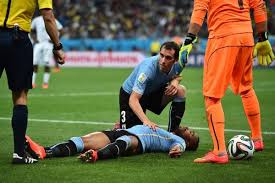By Andrew Warshaw in Belo Horizonte
June 26 – FIFA medical experts have admitted they are powerless to intervene in cases of concussion if national team doctors decide players are fit enough to continue after taking knocks to the head. The controversial issue has re-emerged at the World Cup after Uruguay’s Alvaro Pereira (pictured) was allowed to continue playing against England after being briefly knocked unconscious in the game between the two sides last week.
While FIFA has imposed specific guidelines about protecting the health of players, the team doctor has the final say.
In this most recent case, Uruguay team doctor Alfredo Pan signalled for a substitution but Pereira insisted in playing on – and was allowed to do so, prompting concern from players’ union FIFPro which proposed a temporary substitution while a player was being assessed.
A FIFpro statement said: “Football is awash with incidents in which players suffer potentially concussive blows to the head and stay on the pitch. In Pereira’s case, he demanded to play on, overruling advice from Uruguay’s team physician for him to be immediately substituted.
“FIFPro understands that in certain moments, faced by the pressures of such an important international stage, many players would react in this way. There are times, however, when the players also require greater protection against the prospect of making any rash decisions.
“The World Cup must set the standard for player health and safety to educate the international football community. Medical evidence shows that a person faces the risk of very serious brain injury, or worse, if he or she suffers a severe head trauma from a concussive blow.”
Addressing a recent briefing in Rio, Jiri Dvorak, FIFA’s chief medical officer, remarked: “FIFA can regulate many things but when it comes to health we cannot make strict regulations, we can only make recommendations . . . we can manage and educate but we cannot overrule the team physician.”
“I have spoken with Dr Pan and the responsible FIFA medical officer who was at that stadium. With this player a diagnosis of concussion was not established.
“He was examined at the time and after the match – he was also called for the doping control – he was re-examined by several doctors. Later he was sent to hospital for an MRI scan which proved absolutely normal.”
Michel D’Hooghe, who chairs FIFA’s medical committee, explained why temporary substitutes was not ideal. “Suddenly 10 minutes cooling down then coming up again without warming up, I can assure you you’ll have more muscle lesions,” he said.
Contact the writer of this story at moc.l1745057015labto1745057015ofdlr1745057015owedi1745057015sni@r1745057015ebab.1745057015werdn1745057015a1745057015

